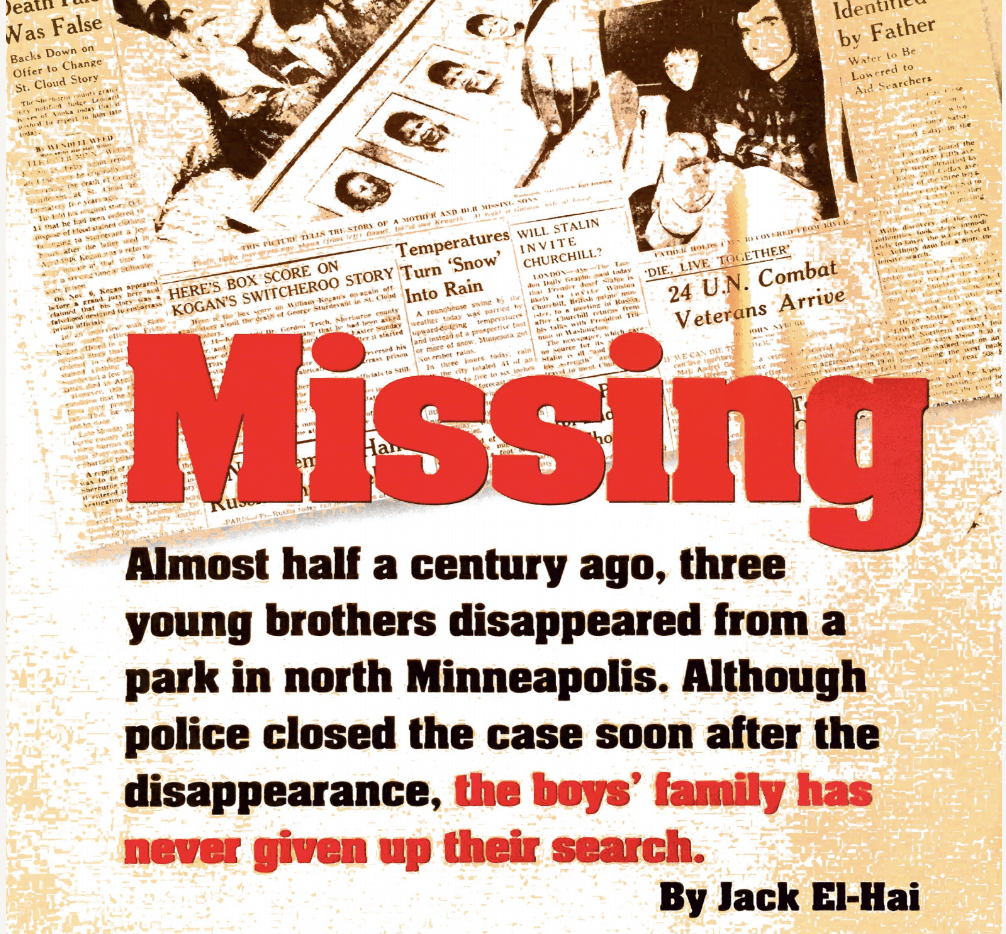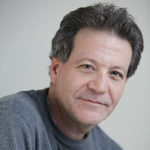
Twenty-three years ago, I started researching one of the nation’s oldest active missing-child cases, a mystery that began less than four miles from my own house in Minneapolis. In 1951, three brothers — Kenneth Jr., 8, David, 6, and Danny Klein, 4 — vanished on a Saturday afternoon on their way to a park. The police investigated and closed the case after only five days, concluding that the boys drowned in the Mississippi River, more than a mile away from home, and that no foul play occurred.
But thorough searches never recovered any bodies from the river, and little evidence pointed to the brothers going there, so parents Betty and Kenneth Klein continued hunting for their children on their own. By the time I learned about the case in 1997, the Kleins had been searching for 36 years without success. I wrote a magazine story about the family’s plight in 1998, and later kept in occasional touch with the parents.
Then, in 2013, I received an email from a sheriff’s deputy several counties away. She and her colleague were investigating the Klein case on their own time, and they wanted to know what I still had. I eventually sent her my notes and copies of the police case file and FBI records I had obtained through Freedom of Information Act requests. By this time, Betty and Kenneth had died, but their five surviving sons were continuing the search.
Over the next several years, the story heated up. The sheriff’s deputies made real progress and determined the boys had likely been abducted. Through much hard work, they developed a list of suspects and a course of action for police to pursue. But the case was orphaned, with no police agency with jurisdiction willing to reopen it.
I decided to jump back into the story. I saw it not only as an investigation of what happened to the brothers, but as a tale of the Klein family staying together and persisting in its search through decades of loss and discouragement. I proposed the Klein story as a book for the University of Minnesota Press — published in October 2019 as The Lost Brothers — but I suspected that this dramatic tale could interest audiences in other media.
Rethinking for another medium
In late 2017, I met with a producer I knew at Twin Cities PBS and told him the Klein saga. I was hoping to convince him to approve a video documentary about the case. But as we talked things over, we realized that a narrative audio podcast might be more effective in telling the story. For Twin Cities PBS, a podcast would expose their work to a young audience they coveted. For me, the project would produce interviews and information that I could also use in my research for the book, help my book’s sales, and teach me how to structure a story and write for a medium that interested me.
Twin Cities PBS agreed to pay me $5,000 for hosting and writing the podcast. It’s a modest sum that I proposed, but I considered this a learning experience that would soon bring me additional benefits. We negotiated a contract that did not interfere with the performance rights and other subsidiary rights attached to my book. (My literary agent gave helpful suggestions.) Twin Cities PBS also did me the favor of assigning Katie O’Rourke, a talented producer and Peabody Award-winning documentarian, to the project.
Over 15 months, Katie and I gathered and created a wealth of material — historical audio, contemporary interviews, and on-site recordings — as we worked out a structure for the story and a voice for the storytelling that would intrigue podcast listeners. For each of the six episodes, she cut and assembled the audio material into a rough order, I wrote connecting narration, and we discussed what to add, change, or move. One of the station’s recording engineers, Terry Gray, gave the program professional polish, and my cousin, the film and stage orchestrator, Robert Elhai, composed original music. It was a stimulating collaboration, one that produced an approach to telling the Klein brothers story that is completely different from that of my book. Katie’s contributions were essential and transformative.
I’ve come to believe that while books provide a conduit into the reader’s mind, podcasts deliver a whisper in the ear. The best podcasts are personal and intimate. Our decision to have me narrate and host the podcast, speaking in the first person and telling the story through my personal perspective, came from that belief.
Our podcast, Long Lost, has been out and available on all podcast platforms since November 2019. Nearly 100,000 people have listened to it, and the reviews and reactions are encouraging. Several listeners have written to me with tips concerning the case of the lost Klein brothers, and we hope our work and the contributions of listeners will lead to badly needed certainty for the Klein family. I will give no spoilers, but the podcast has pushed tantalizingly close to a solution of the case.
Katie and I hope to soon release a new episode, a postscript that tells of a break in the case that the podcast helped produce and reports on a meeting between the living Klein brothers and someone with a connection to a suspect. While I usually feel my published articles and books have reached a planned conclusion, Long Lost shows that the endings of narrative podcast series can be more changeable.
Working on Long Lost made me a better and more versatile writer. I learned narrative and investigative techniques that will improve all of my work. The podcast is helping my book sales, too, although it is still too early to know how much. Already I crave involvement in another podcast.
Jack El-Hai, a past president of ASJA, publishes the free monthly Damn History newsletter (archives and sign-up https://tinyletter.com/jelhai) for writers and readers of popular history. He is the author of The Lost Brothers, The Nazi and the Psychiatrist, The Lobotomist, and many other history-related books. His articles have appeared in The Atlantic, Wired, Discover, GQ, Scientific American Mind, and the Washington Post Magazine, among other publications. This article first appeared in the Freelance Success newsletter.

